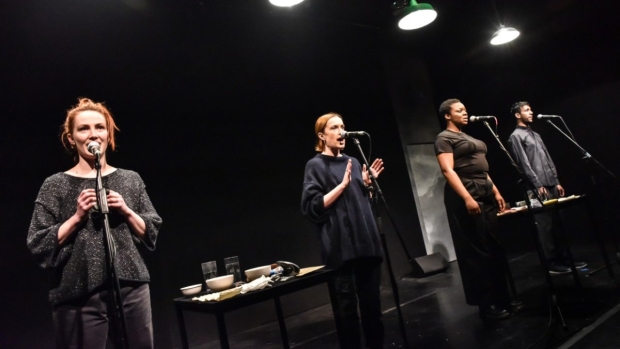little scratch review – a rhythmically and pyschologically intense 4D audio experience
The production runs at the Hampstead Theatre

© Robert Day
Near the beginning of little scratch there's a cry: "What will come sooner? Telling him or writing?" The unnamed female protagonist, a writer who is struggling to exist after being raped by her boss, realises she can't carry on in her life in the way she is doing without telling someone what happened to her. Seeking to maintain the status quo, another internal voice tells her she has to. Another voice beyond these, in a place where life rubs abrasively up against the unconscious, knows she will not.
Playwright Miriam Battye's play script is a close adaptation of novelist Rebecca Watson's experimental and award-winning novel of the same name, published in 2020. Written entirely from the protagonist's point of view, the novel looks like a visual poem, text stacked into columns printed side by side on the page. The effect is that the words build a prison that the protagonist and the readers are trapped in by simultaneously expressing how we experience life as present, past and future along with internal numerous commentaries and interrupting flashes of PTSD. The irony for the writer protagonist too, is that words can't help her here – only the literal scratching of her body can.
In this production under Katie Mitchell's direction, this prisonlike almost locked-in syndrome effect is transferred into a 4D audio experience via four actors representing the protagonist's numerous voices talking simultaneously down microphones and occupying multiple psychological spaces. The protagonist does not have a physical body, nor do any of the other characters.
This is where the power lies because we are forced to focus on the witty and comedic descriptions of the daily struggle to get to work during rush hour which steadily and horrifically mutate into a detailed examination of how the rape and the consequent PTSD exerts itself. In response the protagonist chooses to exert a huge amount of control over her bodily functions, to practise a form of self-harm via scratching, desperate to maintain a sense of control over her body in whichever way possible. Agonising over whether to tell her "My him" boyfriend, she avoids the word rape – still it manifests itself as she unconsciously and brutally sexualises everyday objects and foodstuffs and conversations.
Production choices taken by Mitchell at first seem underwhelming until realisation dawns that it's because she does not want us to focus on the physicality of the protagonist at the expense of her experience. Neither is the male rapist or the patriarchy referenced too much. The experience of the trauma feels to the ears like an assault, which rhythmically jerks at points. Mitchell also plays with the idea of artistic control – the protagonist has none, suffering writer's block. The fact that the actors are their own foley artists somehow feels like giving some integrity and authorship back to the protagonist.
It's an intense if detached account of how rape invades and poisons every aspect of a person's life and dares you not to turn away.












